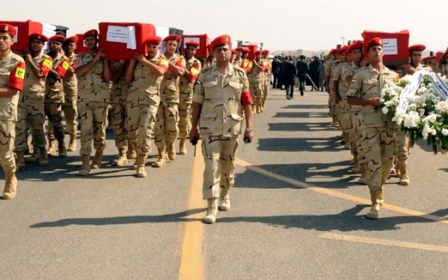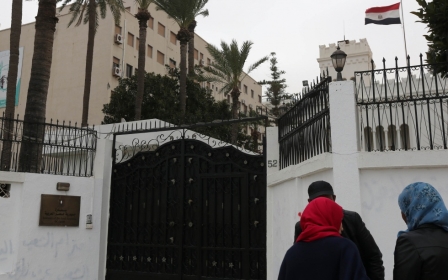Cairo activist takes her own life after becoming 'fed up with reality' in Egypt

An Egyptian political activist took her own life at home in Cairo on Thursday, according to her friend who spoke to Anadolu Agency (AA), Turkey's official state news agency.
Zeinab Mahdi, who graduated from Cairo’s Al-Azhar University in 2011 and was in her early twenties, killed herself on Thursday in her west Cairo apartment, Ahmed Mahdi told AA. He said prosecutors have started an investigation into the incident and sealed the apartment to check for further evidence.
Mahdi was active in the 2011 revolution that led to the removal of Hosni Mubarak from power after 30 years of ruling Egypt.
She had been a member of the Muslim Brotherhood but left the movement in the wake of the uprising nearly four years ago and later campaigned for the renegade Brotherhood leader Abdel-Moneim Abul-Fotouh who stood as an independent candidate during the 2012 presidential election.
Mahdi was critical of Mohammed Morsi’s short-lived presidency but joined a mass sit-in last July by his supporters at Raba’a Square – where hundreds were killed by security forces – after the Islamist leader was ousted from power in a popularly-backed military coup.
The young political activist had also been a vocal critic of current president and former army chief Abdel-Fattah al-Sisi and called for the release of all those put in prison since Morsi’s ouster – estimated by Egyptian monitoring group Wikithawra to be over 40,000 people.
Prior to her death Mahdi had become withdrawn, according to friends, who said she had grown frustrated with Egypt’s political conditions.
“Zeinab tried to defend the principles of the 2011 revolution until she got fed up with reality,” Mohamed al-Qassas, a friend and fellow activist, told AA.
“Revolutionary youths are unfortunately in a state of defeat. Some of them fled the country while others died defending the revolution’s principles.”
While the suicide rate in Egypt showed a 33 percent drop between 2000 and 2012, according to the World Health Organisation, there have been a number of recent incidents where people have taken their own lives in such a way as to communicate a strong political message.
In September Farag Rizk hanged himself from a billboard a road connecting Cairo with north Egypt and a photo of him hanging was shared widely on social media.
Local media reports said the 48-year-old driver had been “suffering from financial difficulties” and “could not meet his family’s needs”.
Rizk’s death coincided with President Sisi speaking at the UN General Assembly in New York, where he spoke of “prosperity and growth” in Egypt.
Activists have written critically of projecting Egypt as being on the road to progress and success and referenced Rizk’s suicide as illuminating an uncomfortable truth.
“That Mr. Rizk chose such a public place to end his life forced many to see an Egypt they preferred to ignore and deny – one in which the anguish of poverty could force a man to die alone, swinging from a billboard,” prominent feminist and activist Mona Eltahawy wrote in the New York Times last month.
Stay informed with MEE's newsletters
Sign up to get the latest alerts, insights and analysis, starting with Turkey Unpacked
Middle East Eye delivers independent and unrivalled coverage and analysis of the Middle East, North Africa and beyond. To learn more about republishing this content and the associated fees, please fill out this form. More about MEE can be found here.




